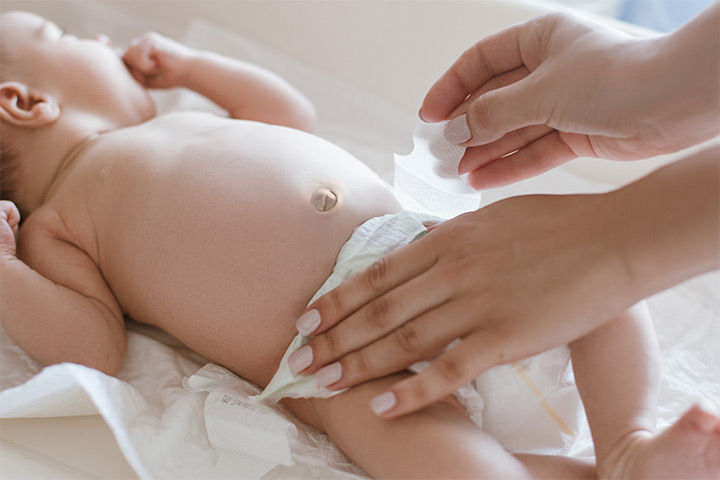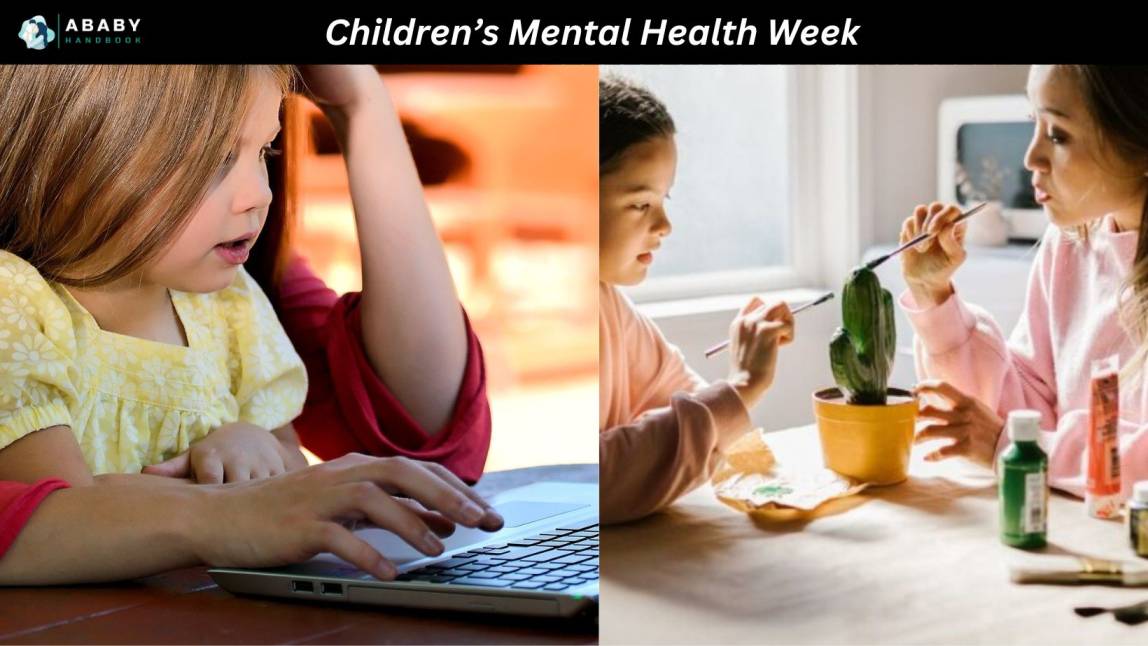The color and consistency of a baby’s poop need to be noticed while changing their diaper. Any abnormality in the stool is often a sign of the baby being unwell. So, what does a green-colored poop indicate?
In this MomJunction post, we tell you about the causes, treatment, and prevention of green poop in babies.
Is It Normal For Breastfed Babies To Have Green Poop?
If your baby is growing and gaining weight optimally, then green poop may not be a matter of concern. A breastfed baby’s poop is usually mustard yellow, green, or brown in color. Newborns have green, brown, or black tar-like stool known as “meconium” (1).
Signs of a healthy bowel movement in breastfed infants are a seedy or pasty stool with loose consistency, similar to that of diarrhea (2).
When To See A Doctor?
You need not consult a doctor each time your baby excretes green poop. However, if the following symptoms accompany green poop, then you should see a doctor.
- Excessive gas
- Irritability
- Slow growth
- Diarrhea
- Dehydration
- Vomiting
- Reduced appetite
What Causes Green Poop In Babies?
Green poop can be alarming but is not always a cause of concern. The following are the various reasons why a baby could have green stools.
- When the food passes through intestines quickly, the bile in the food is not absorbed back into the body. It might occasionally happen in babies since their digestive system is still developing. Dark green stool is usually caused due to bile juices.
- Newborns who receive phototherapy for neonatal jaundice might have green poop as the excess bile is excreted through the stool (3).
- Babies who become gassy, cranky, and cry after breastfeeding might be lactose intolerant. Lactose intolerance can lead to a foamy or frothy green stool, along with diarrhea (4).
- Some viral infections of the stomach, such as rotavirus infections, may also cause diarrhea and green stool (5).
- A breastfed baby might have green stools if they are allergic to some foods eaten by the mother. Allergies are usually accompanied by some form of skin reaction as well (6).
- Green stools are seen more commonly in formula-fed infants than in breastfed infants. However, it is not exclusive to formula-fed babies and may occur in either of them (7).
- If a mother eats a diet rich in leafy greens like spinach, then the baby might pass green stool. If a baby on solids is given pureed spinach or peas, then there are high chances for the baby to have green stools (8).
- Babies on iron supplements might also pass green stools (9). Some baby formulas are fortified by iron, and babies on such formulas might also have a green stool.
- An insufficient diet may also cause green stool in babies.
- It is believed that foremilk and hindmilk imbalance may cause green stool. Foremilk is the low-fat lactose-rich milk that the breasts produce first when the baby begins feeding. Hindmilk is the high-fat milk produced later during the breastfeeding session. Fat prevents the milk from passing quickly through intestines. A baby might not get sufficient fat if the mother switches the baby from one breast to another, too soon. The baby will receive more foremilk, and it can cause the milk to pass through the intestines quickly along with bile juice, thus causing green stools.
- This condition can happen even when the mother produces excess foremilk, which can cause the baby to experience lactose overload, another cause for green stools (10).
Some people believe that teething might cause green stool in babies. However, there is not enough researched-based evidence to prove the same.
Treatment For Green Stool In Infants
If the baby is eating well, has no diarrhea, and has overall good health, then there is seldom any treatment required. The doctor will perform a thorough examination and take a detailed history of the baby before suggesting any treatment. Some of the treatment options are:
- Breastfeeding is the best form of nutrition for a baby. The doctor might recommend exclusive breastfeeding (if possible) for babies when the formula is the suspected cause of green stools. If breastfeeding is not possible due to various reasons, they might suggest a change in the formula.
- If the baby has green stools and diarrhea due to an infection, then the doctor may prescribe some medications (5).
- A few research studies claim that prebiotics may help in treating green stools and improving stool consistency (11). Do not give any prebiotics to your baby without consulting the doctor.
- If lactose intolerance is the cause, then the baby can consume low lactose or a lactose-free formula. It might even help improve weight gain in babies with acute diarrhea caused by lactose intolerance (4).
- If the doctor suspects a food allergy, then the mother will have to keep a watch on the change in the baby’s poop color. Making a note of the food you eat and then correlating it with the altered poop color of the baby might help in identifying the allergen and avoiding it. Some common allergens are eggs, nuts, dairy products, wheat, fish, soy products, and corn (6).
- If you feel that your baby is getting inadequate feed or have any issues with breastfeeding, then the doctor might refer you to a lactation consultant.
How To Prevent GreenStool In Babies?
The prevention of green poop is based on the cause. There is no need to work on prevention if the baby is passing green poop due to the consumption of green leafy vegetables or iron supplements. But you might need to take preventive measures for the following conditions.
- If an allergen is found to be responsible for green poop, identify and avoid it.
- If cow’s milk is the reason, then the breastfeeding mother may avoid it. If the baby is drinking cow’s milk, stop for a few days, and check.
- An elimination food chart might help in identifying the allergen. Note down the food that the breastfeeding mother or the baby has and correlate the food item with green poop.
- Maintain good hygiene while serving solids to a baby older than six months of age. It can help prevent the spread of gastrointestinal infections, which may cause green stools.
Frequently Asked Questions
1. Is green poop a sign of infection in babies?
Green poop is not always a sign of infection. But certain viral infections such as rotavirus might cause green poop. Your doctor can diagnose the cause of infection.
2. Is green poop normal in formula-fed babies?
Green poop is not noticed in all formula-fed babies. However, some studies show that green poop is more common in formula-fed babies than in breastfed babies.
Green stools are not always a cause of concern. In most cases, it resolves with dietary and lifestyle modifications. However, do not hesitate to talk to your baby’s doctor if you have any doubts or queries regarding the same.
What do you think could be reasons for green stool in babies? Let us know in the comment section below.
References:
2. 12 Types of Baby Poop & What They Mean; Blank Children’s Hospital
3. Your Baby, Jaundice, and Phototherapy; University of Michigan
4. Gaurav Sethia, Srinivas Sankaranarayananb, andManpreet Sukhia, Low lactose in the nutritional management of diarrhea: Case reports from India; Journal of Clinical Epidemiology and Global Health
5. Frequently Asked Questions About Rotavirus; National Foundation for Infectious Diseases
6. Diet for Breastfeeding Mothers; Children’s Hospital of Philadelphia
7. den Hertog J et al., The defecation pattern of healthy term infants up to the age of 3 months; U.S. National Library of Medicine
8. Stools – Unusual Color; Seattle Children’s
9. Ekhard E Ziegler, Steven E Nelson, and Janice M Jeter, Iron supplementation of breastfed infants from an early age; The American Journal of Clinical Nutrition
10. Lactose overload; Iowa government Wendy K.W. Yap et al.,
11. Changes in Infants Faecal Characteristics and Microbiota by Inulin Supplementation;. Journal of Clinical Biochemistry And Nutrition










